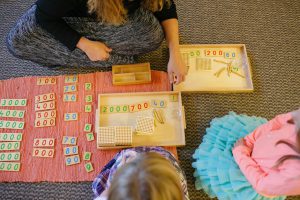What is the Montessori Method?
January 31, 2022What Makes an Authentic Montessori School?
February 16, 2022Do you remember your last year of elementary or middle school? You were finally the oldest at the school! You were, at last, the coveted “big kid” you’d been admiring for years. This is how children feel about the leadership year of the three-year cycle at a Montessori school.
During their first two years, children in a Montessori class work with the older kids in their class, seeing them as leaders and turning to them for help and looking to them as an example. They also look forward to the day that they get to step into that role. This final year is called the leadership year, or sometimes the capstone year or, more simply, kindergarten, and it is incredibly important. Let’s talk about why!
Reasons to Stay for Kindergarten
The Familiar is Family
Unlike at a traditional school, in Montessori schools, children stay with the same teachers through years-long cycles. At the preschool level, children will have the same teacher from ages 3 through 6. If you stay for kindergarten, your child will have a teacher who knows them well and with whom they have a close and comfortable relationship. They will also have many close friends and peers in their class. Children are comfortable in a familiar environment and are able to “hit the ground running”; switching to a new school for kindergarten will require an adjustment period before children can get down to work, whereas staying in the Montessori environment allows children to build on what they’ve spent the past two years on, leading to both mastery and rapid growth.

Leadership Skills for Life
It’s not called the leadership year for nothing! Being the oldest in a multi-age class means children get more classroom responsibilities and privileges. They also chance to develop their leadership skills, and being able to help and care for younger children develops confidence and empathy. Not only that, but helping younger children with their work reinforces the older child’s knowledge of a subject. Giving children the chance to be the oldest in a multi-age room can also increase their self-esteem–who doesn’t like being looked up to and admired?
Formative Assessments, Not Standardized Testing
Children in a traditional kindergarten will almost certainly undergo standardized testing, which can be extremely stressful for them. It’s also not a great measure of real knowledge, nor does it help children in their learning. In a Montessori school, children receive formative assessments. These are done continuously and naturally as a child receives lessons. Teachers will assess knowledge during learning, and lessons can be changed while happening to match the level the child is at. This is much more low pressure for children, but also much more useful. This is the type of individual attention that is often missing in a traditional school.
The Real Reason We Want Your Child to Stay
We have to be honest. We want your child to stay because…we love them! Watching children develop and grow through their three-year cycle is incredible, and it’s seeing that growth that drives Montessori teachers to do what they do. If you have more questions about the leadership year, please don’t hesitate to contact us.